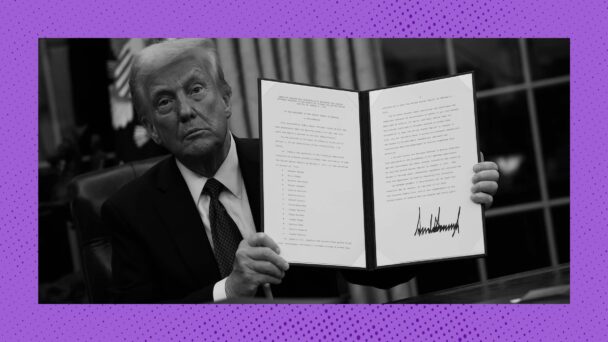On Monday morning, in an all-caps social media post, President Donald Trump wished a happy Memorial Day to “USA HATING JUDGES WHO SUFFER FROM AN IDEOLOGY THAT IS SICK, AND VERY DANGEROUS FOR OUR COUNTRY.” Trump also made a plea, still in capslock, for the U.S. Supreme Court to “SAVE US FROM THE DECISIONS OF THE MONSTERS WHO WANT OUR COUNTRY TO GO TO HELL.”
Against all odds, the “monsters” to whom Trump refers are not Stephen Miller and Kristi Noem, but the federal district court judges who have ruled against the administration 26 times this month alone.
The more judges block Trump’s plainly illegal directives, the more Republicans attack judges. These attacks sometimes go beyond Trump’s insults, or Elon Musk’s call for “an immediate wave of judicial impeachments,” or even House Speaker Mike Johnson’s musings on Congress’s authority to “eliminate an entire district court”: They include threats to the physical safety of federal judges and their families, too. Beginning around February, for instance, judges started receiving anonymous pizza deliveries, which they interpreted as an implicit warning that the sender knows where they live. Dozens of orders have been placed in the name of Daniel Anderl, the son of Judge Esther Salas, who was murdered in his parents’ home five years ago by a self-described “anti-feminist” attorney posing as a deliveryman.
Threats against the judiciary have forced judges to evaluate what they’re willing to do to keep their families safe. On Saturday, the Wall Street Journal reported that judges even weighed the idea of “managing their own armed security force” at the March 2025 meeting of the Judicial Conference, the federal judiciary’s policymaking body.
The Wall Street Journal’s account follows a New York Times report from last month that at a closed-door Judicial Conference session, Judge Richard Sullivan, a George W. Bush appointee whom Trump elevated to the Second Circuit in 2018, asked his colleagues what they should do if Trump withdraws funding for the U.S. Marshals Service—striking testament to the Trump-induced breakdown of the constitutional order.
The Marshal Service is the federal agency within the Justice Department that is responsible for protecting court officials and facilities and enforcing court orders. This might not be that big of a deal if the Attorney General wasn’t Pam Bondi, a Trump loyalist who recently threatened to prosecute judges for “harboring fugitives” if they oppose the administration’s efforts to take over courtrooms while making immigration arrests. Judges don’t trust the executive branch to keep them safe from threats of violence when the executive branch itself is the soil from which threats of violence grow.
Even if the Trump administration didn’t cut judicial security funds as a retaliatory measure, the Marshal Service’s position within the executive branch means it’s still vulnerable to the whims of the “Department of Government Efficiency,” Elon Musk’s slash-and-grab outfit looting public infrastructure. Last month, Marshals Service Acting Director Mark Pittella sent a letter to over 5,000 employees encouraging them to resign in exchange for paid administrative leave. The Marshals Service has fewer than 5,600 employees to begin with.
Congressional funding of courthouse security hasn’t kept pace with the threats, either. Congress passed a continuing resolution in March that provided the judicial branch with $47 million less than it requested for court security appropriations. Last week, Democrats introduced legislation that would move the agency’s operation and direction to the judiciary so that Marshals can do their jobs without political interference—a reasonable idea that, in a Republican-controlled House, is probably going to have a tough time making the agenda.
In a written statement, California Democrat Representative Eric Swalwell highlighted the possible conflict that could emerge when judges must decide cases involving the executive branch while also depending on the executive branch for their personal security. “I have seen how threats of violence to members of Congress pressure them into staying silent or influence their votes on the House floor,” Swalwell said. “We cannot allow the same calculations to creep into the deliberations of independent judges.”
That ship has sadly sailed. One anonymous jurist admitted to the Wall Street Journal that, “for a brief moment,” they wondered whether a legally correct ruling against the Trump administration was “worth it,” or if they should “prioritize the protection of your family and yourself and your court.” Now, judges are spending their time looking into getting their own security force, because they know they can’t look to Republicans.





